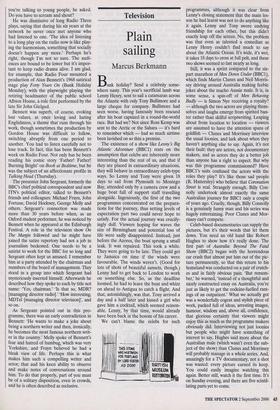Television
Plain sailing
Marcus Berkmann
Bank holiday? Send a celebrity some- where nasty. This year's sacrificial lamb was Lenny Henry, sent to sail a catamaran across the Atlantic with only Tony Bullimore and a large cheque for company. Bullimore had seen worse, having famously been rescued after his boat capsized in a round-the-world race. But had we? Not since Ross Kemp was sent to the Arctic or the Sahara — it's hard to remember which — had so much airtime been lavished on so thin a premise.
The existence of a show like Lenny's Big Atlantic Adventure (BBC1) rests on the assumption that celebs are inherently more interesting than the rest of us, and that if they are placed in extraordinary situations, they will behave in extraordinary celeb-type ways. So Lenny and Tony were given 18 days to sail from Plymouth to Montego Bay, attended only by a camera crew and a huge boat full of support staff travelling alongside. Ingeniously, the first of the two programmes concentrated on the prepara- tions for the journey, thus setting levels of expectation part two could never hope to satisfy. For the actual journey was crucify- ingly dull. Viewers hoping for waves the size of Birmingham and potential loss of life were sadly disappointed. Instead, just before the Azores, the boat sprung a small leak. It was repaired. This took a while. They were going to be late. They could get to Jamaica on time if the winds were favourable. The winds weren't. (Good for lots of shots of beautiful sunsets, though.) Lenny had to get back to London to work on something else. So, as the deadline loomed, he had to leave the boat and whizz on ahead to Antigua to catch a flight. And that, astonishingly, was that. Tony arrived a day and a half later and kissed a girl who gave him a cocktail, which seemed reason- able. Lenny, by that time, would already have been back in the bosom of his career.
We can't blame the celebs for such programmes, although it was clear from Lenny's closing statement that the main les- son he had learnt was not to do anything like it again. Lenny and Tony swore undying friendship for each other, but this didn't exactly leap off the screen. No, the problem was that even as talented a comedian as Lenny Henry couldn't find much to say about the Atlantic Ocean. It's wide, it's wet, it takes 18 days to cross at full pelt, and these two shows seemed to last nearly as long.
Still, it was a sprint compared to the six- part marathon of Men Down Under (BBC1), which finds Martin Clunes and Neil Morris- sey driving around Australia making feeble jokes about the macho Aussie male. It is, in some sense, a spin-off of Men Behaving Badly — is Simon Nye receiving a royalty? — although the two actors are playing them- selves and laughs emerge from spirited ban- ter rather than skilful scriptwriting. Leaping about from location to location — viewers are assumed to have the attention spans of goldfish — Clunes and Morrissey interview the usual loonies, and lark about when they haven't anything else to say. Again, it's not their fault: they are actors, not documentary makers, and as actors they do a better job than anyone has a right to expect. But why was this programme commissioned? Have BBC1's suits confused the actors with the roles they play? It's like those sad people (R. Hattersley) who believe that Coronation Street is real. Strangely enough, Billy Con- nolly undertook almost exactly the same Australian journey for BBC1 only a couple of years ago. Cruelly, though, Billy Connolly is a genuinely funny man and his series was hugely entertaining. Poor Clunes and Mor- rissey can't compete.
Celeb-based documentaries can supply the pictures, but it's their words that let them down. You need an old hand like Robert Hughes to show how it's really done. The first part of Australia: Beyond The Fatal Shore (BBC2) began with the horrendous car crash that almost put him out of the pic- ture permanently, so that this return to his homeland was conducted on a pair of crutch- es and in fairly obvious pain. 'But remem- ber,' he warned, 'instead of a thoughtful and nicely constructed essay on Australia, you're just as likely to get the codeine-fuelled rant- ings of an outpatient.' What we actually got was a wonderfully cogent and stylish piece of work, packed full of ideas, arresting images, humour, wisdom and, above all, confidence, that glorious certainty that viewers might enjoy this as much as the programme makers obviously did. Interviewing not just loonies but people who might have something of interest to say, Hughes said more about the Australian male (which wasn't even the sub- ject of the show) than Clunes and Morrissey will probably manage in a whole series. And, amazingly for a TV documentary, not a shot was wasted: every picture earned its keep. You could easily imagine watching this again. Better still, watch it the first time. It's on Sunday evening, and there are five scintil- lating parts yet to come.


























































 Previous page
Previous page